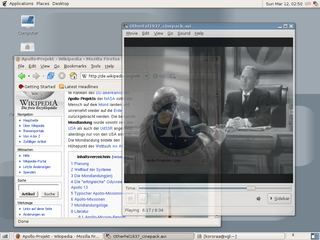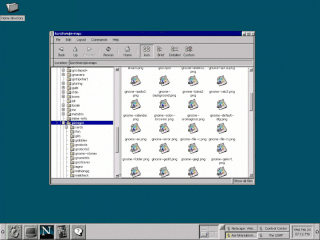Related Research Articles

The X Window System is a windowing system for bitmap displays, common on Unix-like operating systems.
In computing, a desktop environment (DE) is an implementation of the desktop metaphor made of a bundle of programs running on top of a computer operating system that share a common graphical user interface (GUI), sometimes described as a graphical shell. The desktop environment was seen mostly on personal computers until the rise of mobile computing. Desktop GUIs help the user to easily access and edit files, while they usually do not provide access to all of the features found in the underlying operating system. Instead, the traditional command-line interface (CLI) is still used when full control over the operating system is required.
GNOME Files, formerly and internally known as Nautilus, is the official file manager for the GNOME desktop. GNOME Files, same as Nautilus, is a free and open-source software under the terms of the GNU Lesser General Public License.
In computing, cross-platform software is computer software that is designed to work in several computing platforms. Some cross-platform software requires a separate build for each platform, but some can be directly run on any platform without special preparation, being written in an interpreted language or compiled to portable bytecode for which the interpreters or run-time packages are common or standard components of all supported platforms.
freedesktop.org (fd.o), formerly X Desktop Group (XDG), is a project to work on interoperability and shared base technology for free-software desktop environments for the X Window System (X11) and Wayland on Linux and other Unix-like operating systems. Although freedesktop.org produces specifications for interoperability, it is not a formal standards body.
reStructuredText is a file format for textual data used primarily in the Python programming language community for technical documentation.
Computer operating systems based on the Linux kernel are used in embedded systems such as consumer electronics, in-vehicle infotainment (IVI), networking equipment, machine control, industrial automation, navigation equipment, spacecraft flight software, and medical instruments in general.

Xgl is an obsolete display server implementation supporting the X Window System protocol designed to take advantage of modern graphics cards via their OpenGL drivers, layered on top of OpenGL. It supports hardware acceleration of all X, OpenGL and XVideo applications and graphical effects by a compositing window manager such as Compiz or Beryl. The project was started by David Reveman of Novell and first released on January 2, 2006. It was removed from the X.org server in favor of AIGLX on June 12, 2008.
D-Bus is a message-oriented middleware mechanism that allows communication between multiple processes running concurrently on the same machine. D-Bus was developed as part of the freedesktop.org project, initiated by GNOME developer Havoc Pennington to standardize services provided by Linux desktop environments such as GNOME and KDE.

NetworkManager is a daemon that sits on top of libudev and other Linux kernel interfaces and provides a high-level interface for the configuration of the network interfaces.

Univel, Inc. was a joint venture of Novell and AT&T's Unix System Laboratories (USL) that was formed in December 1991 to develop and market the Destiny desktop Unix operating system, which was released in 1992 as UnixWare 1.0. Univel existed only briefly in the period between AT&T initially divesting parts of USL in 1991, and its eventual outright purchase by Novell, which completed in June 1993, thereby acquiring rights to the Unix operating system. Novell merged USL and Univel into their new Unix Systems Group (USG).
The Tango Desktop Project was an open-source initiative to create a set of design guidelines and to provide a consistent user experience for applications on desktop environments. The project created a set of icons known as the Tango Icon Library and that were described as a "proof of concept". The Tango Desktop Project was a project of freedesktop.org, and was closely linked with other freedesktop.org guidelines, such as the Standard Icon Theming Specification.

PulseAudio is a network-capable sound server program distributed via the freedesktop.org project. It runs mainly on Linux, including Windows Subsystem for Linux on Microsoft Windows and Termux on Android; various BSD distributions such as FreeBSD, OpenBSD, and macOS; as well as Illumos distributions and the Solaris operating system. It serves as a middleware in between applications and hardware and handles raw PCM audio streams.

Linux is a family of open-source Unix-like operating systems based on the Linux kernel, an operating system kernel first released on September 17, 1991, by Linus Torvalds. Linux is typically packaged as a Linux distribution (distro), which includes the kernel and supporting system software and libraries, many of which are provided by the GNU Project.
HAL is a software subsystem for UNIX-like operating systems providing hardware abstraction.
In information and communications technology, a media type, content type or MIME type is a two-part identifier for file formats and content formats. Their purpose is comparable to filename extensions and uniform type identifiers, in that they identify the intended data format. They are mainly used by technologies underpinning the Internet, and also used on Linux desktop systems.
A desktop environment is a collection of software designed to give functionality and a certain look and feel to an operating system.

Criticism of desktop Linux is a history of comment on the perceived shortcomings of the Linux operating system when installed on desktop computers. These criticisms have been aimed at the plethora of issues and lack of consistency between Linux distributions, their usefulness and ease of use as desktop systems for general end users, driver support and issues with multi-media playback and audio development.
Besides the Linux distributions designed for general-purpose use on desktops and servers, distributions may be specialized for different purposes including computer architecture support, embedded systems, stability, security, localization to a specific region or language, targeting of specific user groups, support for real-time applications, or commitment to a given desktop environment. Furthermore, some distributions deliberately include only free software. As of 2015, over four hundred Linux distributions are actively developed, with about a dozen distributions being most popular for general-purpose use.

GNOME 1 is the first major release of the GNOME desktop environment. Its primary goal was to provide a consistent user-friendly environment in conjunction with the X Window System. It was also a modern and free and open source software alternative to older desktop environments such as the Common Desktop Environment (CDE), but also to the K Desktop Environment (KDE). Each desktop environment was built-upon then proprietary-licensed widget toolkits, whereas GNOME's goal from the onset, was to be freely-licensed, and utilize the GTK toolkit instead.
References
- ↑ Portland points desktop Linux at $10 billion market Archived October 12, 2006, at the Wayback Machine , DesktopLinux.com, 11 October 2006
- ↑ "Association between MIME types and applications". specifications.freedesktop.org. Archived from the original on 2020-03-24. Retrieved 2020-03-24.
